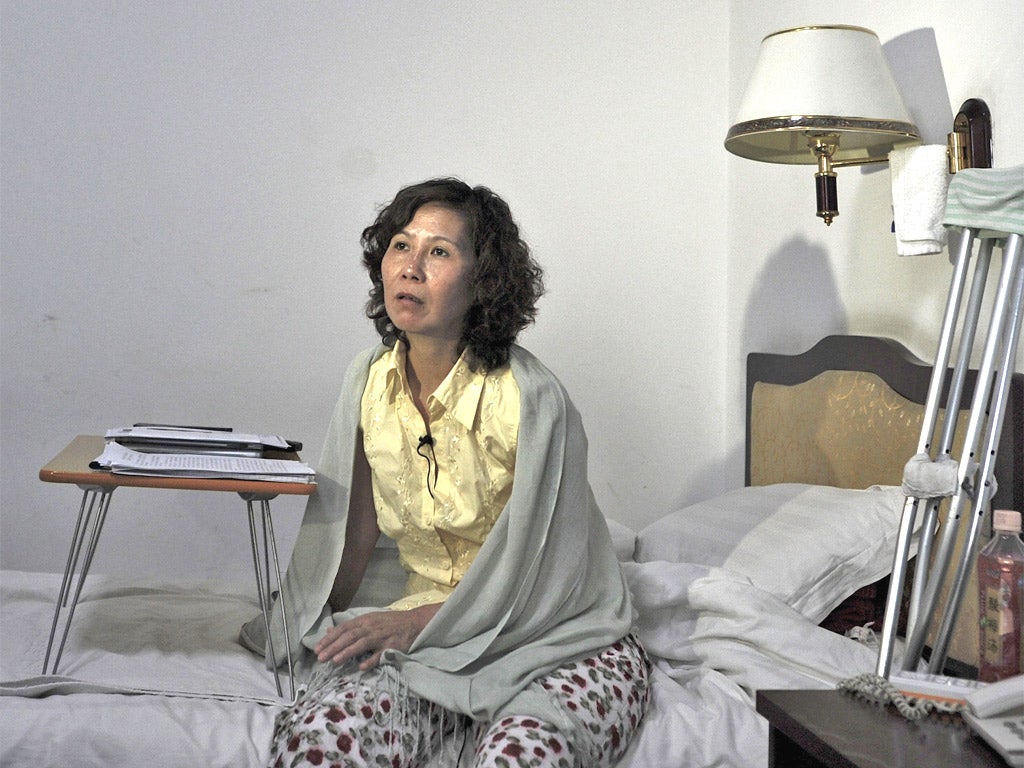China cracks down – on a dissident in her sickbed
Campaigning lawyer says decade of torture has left her crippled – but state refuses to delay trial

Your support helps us to tell the story
From reproductive rights to climate change to Big Tech, The Independent is on the ground when the story is developing. Whether it's investigating the financials of Elon Musk's pro-Trump PAC or producing our latest documentary, 'The A Word', which shines a light on the American women fighting for reproductive rights, we know how important it is to parse out the facts from the messaging.
At such a critical moment in US history, we need reporters on the ground. Your donation allows us to keep sending journalists to speak to both sides of the story.
The Independent is trusted by Americans across the entire political spectrum. And unlike many other quality news outlets, we choose not to lock Americans out of our reporting and analysis with paywalls. We believe quality journalism should be available to everyone, paid for by those who can afford it.
Your support makes all the difference.A lawyer left wheelchair-bound after alleged mistreatment in police custody went on trial yesterday, testifying from a sickbed. Earlier in the week two other rights activists were jailed for up to 10 years as Beijing continued its crackdown on dissent.
Ni Yulan, 51, is charged with fraud and falsifying information to steal property. She is also charged, along with her husband, Dong Jiqin, with causing a disturbance at a guesthouse where the couple were detained by police.
Her daughter, Dong Xuan, told reporters that her mother appeared at the opening of her trial in a bed, and relied on an oxygen mask to help her breathe. "Seeing my mother lying on that bed, it made my heart ache," Ms Dong said. "This is definitely not a normal trial procedure, so I feel the risk of conviction is high," she added.
Ms Ni and Mr Dong were arrested this year during an operation to prevent "Arab Spring"-style unrest taking hold in China. The Beijing leadership remains troubled by slowing economic growth and rising inflation, and its fears have been compounded by a recent series of violent protests in the south of the country. Tensions are also running high because next year President Hu Jintao and Premier Wen Jiabao will gradually hand over power, probably to the senior party members Xi Jinping and Li Keqiang. Against this background, China's courts have been busy over the Christmas period.
Two of China's most prominent human rights activists, Chen Wei and Chen Xi, both veterans of the 1989 pro-democracy movement, were jailed for nine and 10 years respectively this week, for posting essays on the internet that the government deemed subversive.
The heavy sentences were in line with the 11 years given to the Nobel Peace Prize laureate Liu Xiaobo on Christmas Day in 2009. The Democracy activist Liu Xianbin was given a 10-year sentence in March this year.
Ms Ni told the court she was not guilty, her lawyer Cheng Hai said outside the courthouse. Her supporters say the charges are trumped up and that Ms Ni and Mr Dong are being punished for their years of activism. The couple are known for helping people forced from their homes while the capital was being renovated for the 2008 Olympics.
Ms Ni claims she has been repeatedly tortured by the security forces over the past decade, leaving her unable to walk. She also suffers from a range of ailments, including heart problems. During her most recent period of detention, between 2008 and 2010, she says she was beaten, subjected to cruel and inhumane punishment, and denied proper medical attention.
While she was in prison, she suffered the same fate as many of the people she represents: her house in an old Beijing neighbourhood was demolished and Ms Ni and her husband were forced to live on the streets, until pressure from overseas forced authorities to allow them to move into a guesthouse.
Yesterday the state-run Global Times newspaper published an editorial saying it was "necessary to decisively punish those who incite subversion of state power. This is to safeguard national security."
The piece accused Western media of linking a criminal case to human rights issues, and said the government was trying to stop a revolution and maintain stability. "China should be firm against political pressure from the West and decisively oppose forces intending to cause political unrest," it said.
Voices of dissent: The regime's political prisoners
Chen Wei
The writer was jailed for nine years last week for subversion after he posted essays online calling for reform of China's one-party system. After the verdict, Mr Chen said: "Dictatorship will fail, democracy will prevail." He took part in the Tiananmen Square protests in 1989.
Chen Xi
The essayist was jailed for 10 years on Monday for a series of articles advocating reform and human rights. He has been jailed several times since being involved in the 1989 Tiananmen Square protests and has played a big role in organising pro-democracy activities.
Join our commenting forum
Join thought-provoking conversations, follow other Independent readers and see their replies
Comments